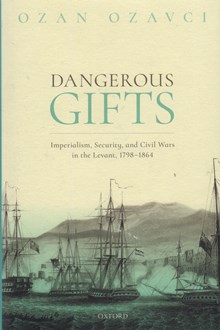Dangerous gifts : imperialism, security, and civil wars in the Levant, 1798-1864 / Ozan Ozavci.
Yer Numarası
A.IX/5075
ISBN
9780198852964 (hardback)
Dil Kodu
İngilizce
Yazar
Eser Adının Farklı Biçimi
Imperialism, security, and civil wars in the Levant, 1798-1864
Basım Bildirimi
First edition [1. baskı].
Yayın Bilgisi
Oxford ; New York, NY : Oxford University Press, 2021.
Fiziksel Niteleme
xiii, 401 sayfa : resim, harita ; 24 cm
Genel Not
İndeks s. [395]-401.
Bibliyografi, vb. Notu
Seçilmiş bibliyografya s. [369]-393.
İçindekiler Notu
PART I. AVANT LE MOT. Crossing the Mediterranean -- The circle of justice and the Napoleonic wars -- The chase in the desert: Empire and civil war in Egypt, 1801-1812 -- PART II: THE INVENTION OF THE EASTERN QUESTION. A new era? The Vienna order and the Ottoman World -- Old enemies: Cairo, Istanbul and the civil war of 1832-33 -- The Russian peace in the Levant -- An unusual quest for revenge: civilisation, commerce, and reform -- Return of the ashes: the concert of Europe and the 1840 intervention -- Part III. THE MOUNTAIN. Beginnings: Mount Lebanon before 1840 -- The age of the Eastern question -- The two wars: Crimea and Mount Lebanon -- An untimely return of the Eastern question? -- Returning the sense of security: The International Commission on Syria.
Özet, vb.
“From Napoleon Bonaparte's invasion of Egypt in 1798 to the foreign interventions in the ongoing civil wars in Syria, Yemen, and Libya today, global empires or the so-called Great Powers have long assumed the responsibility to bring security in the Middle East. The past two centuries have witnessed their numerous military occupations to 'liberate', 'secure' and 'educate' local populations. They staged first 'humanitarian' interventions in history and established hitherto unseen international and local security institutions. Consulting fresh primary sources collected from some thirty archives in the Middle East, Russia, the United States, and Western Europe, Dangerous Gifts revisits the late eighteenth and nineteenth century origins of these imperial security practices. It explicates how it all began. Why did Great Power interventions in the Ottoman Levant tend to result in further turmoil and civil wars? Why has the region been embroiled in a paradox-an ever-increasing demand despite the increasing supply of security-ever since? It embeds this highly pertinent genealogical history into an innovative and captivating narrative around the Eastern Question, emancipating the latter from the monopoly of Great Power politics, and foregrounding the experience of the Levantine actors. It explores the gradual yet still forceful opening up of the latter's economies to global free trade, the asymmetrical implementation of international law in their perspective, and the secondary importance attached to their threat perceptions in a world where political and economic decisions were ultimately made through the filter of global imperial interests“ -- Yayıncı.

 English
English

